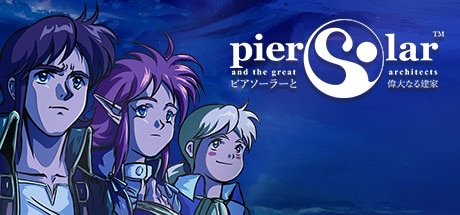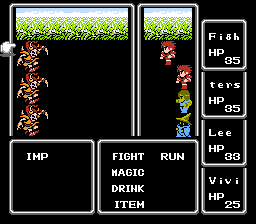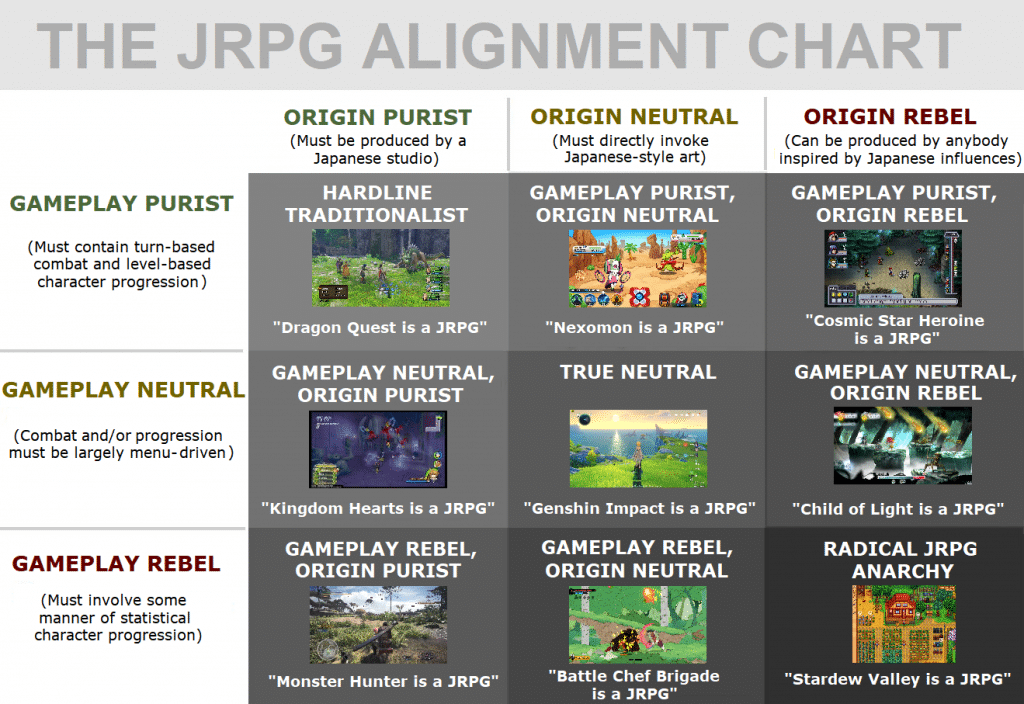What is a JRPG? It stands for “Japanese Roleplaying Game,” and is essentially, an RPG designed and produced in Japan. But it can also mean an RPG (made anywhere) that is made in the style of a Japanese Roleplaying Game. The standard look and feel of a JRPG was set by Dragon Quest in 1986 and Final Fantasy in 1987.
Even games that aren't Japanese, such as Cosmic Star Heroine, are considered JRPGs because they're made to play like DQ, FF, Chrono Trigger, etc.
Whether Thing X falls into Genre Y is one of the geek arguments that never seems to die. And there are plenty of specific ones regarding Japanese RPGs.
What is a JRPG? Is Zelda a JRPG? What exactly makes something a JRPG?
A lot of those are up to personal interpretation, but the last two are especially important. What defines a genre? Is it more than “a bunch of items that kinda look similar”? The term JRPG has been vague for so long that nobody can really agree on how to bundle it together.
But we're certainly going to try.

Who Gets to Define a JRPG?
Usually, I'd hit up our dictionary friends, either Merriam or Webster, to get a good, old-fashioned hard definition of something. As Beej and Austin have shown, having authoritative sources is important. Two problems with that:
- A: Those guys are super-dead, and
- B: The dictionary under their names — perhaps unsurprisingly — has no concept of a “JRPG.”
Admittedly, those dictionaries don't define a lot of things that might be a teensy bit arbitrary or niche. But even other curated dictionary sites will only go as far as spelling out “Japanese Role-Playing Game,” and not explain further.
So let's do the standard internet thing: Take it to the Wikis!
…except that good ol' Wikipedia notably also does not have a page for “Japanese Role-Playing Game.” It has one for History of Eastern Role-Playing Video Games, and a List of Best-selling Japanese Role-Playing Games. But both shy away from being declarative. Rather, the closest we get is:
For the purpose of this article, a JRPG is defined as a franchise which: (1) is considered a role-playing game by reliable sources and was made in Japan, or (2) made in another country, but otherwise the franchise would be difficult to differentiate from a JRPG due to having common traits found in JRPGs such as: anime/manga character designs, RPG elements, fantasy setting and widely considered as being inspired or influenced by a JRPG.
Wikipedia Editor “Dissident93” [1]
Even that's not perfect, considering that the phrase “reliable sources” is every bit as nebulous and subjective as “JRPG”. We can track it back to all being written by a single user, to boot. A fairly prolific user, but it's just one writer's definition nonetheless, and not a community consensus. But hey, it's a start.
Let's Break That Definition of JRPG Down
That's a blurb with many qualifiers, which are all generally warranted. So let's go through those piece by piece to understand why that is.
“Considered a role-playing game by reliable sources”
The idea that a role-playing game is one just because people call it one sure is compelling enough. Words derive power and meaning from how people use them, so in a sense, definitions should come from usage over it being strictly the other way around. But it's also a kind of circular logic, which doesn't help move us in any direction.
A baker can call a Pie a Cake and a Cake a Pie, but it doesn't mean that's what it is.
“…and was made in Japan,”
This is the point where a lot of people clock out: it's an inherently Japanese genre. Role-Playing Games made in Japan are Japanese Role-Playing Games. And, a majority of the time, that's a slam-dunk answer. The most indisputable, “JRPG-est” franchises ever are all distinctly from Japanese creators like Square Enix, Atlus, and Nintendo.
Dragon Quest. Final Fantasy. Xenoblade. Xenogears. Chrono Trigger.
And then…some of the time, you have to weigh those standards against something like the Souls series. They were made by FROM Software, who are decidedly based in Japan. It's not hard to argue that they're roleplaying games, with their level-up-and-build-your-character structure. But moment-to-moment, the player interacts with them like they would an action game:
While “Action RPG” and “JRPG” aren't mutually exclusive (see the widely-agreed-on Secret of Mana, Kingdom Hearts, and Star Ocean), the heavy western influences and chunkier, reaction-focused playstyle make Dark Souls feel distinctly different from Dragon Quest.
So is a Japanese pedigree always enough to override the experience that the game provides? And, in an increasingly cross-cultural industry, what about projects like the not-very-RPG-like Far Cry and Spider-Man, developed in part across multiple continents? Nationality is sometimes a hard thing to ascribe to a thing that can't talk.
“or”
This one tiny word is carrying so much weight. Let's come back to it later.
“made in another country, but otherwise the franchise would be difficult to differentiate from a JRPG due to having common traits found in JRPGs such as“
This gets even muddier – here we're using the word to define itself, which is a big ol' no-no in most dictionaries and encyclopedias. The gist is that if it looks like a duck, walks like a duck, and quacks like a duck, then we're calling it a duck, doggone it. So the next parts are crucial: what does this duck do?
“anime/manga character designs“
What counts as anime and manga is the same kind of can of worms that we're up-ending here. It's hard to pin down; even within “we all agree that this is anime” production, art styles can vary wildly (and in ways that overlap with Western animation). Another “if it feels right” qualifier, which isn't anything stable enough to rest your hat on. It is enough of a baseline to help, though; it's hard to argue that Pier Solar, a game whose developers are ostensibly from Iowa, isn't deliberately evoking shows like Record of Lodoss War.

“RPG elements“
…which is the biggest elephant in the room, because it's yet another wiggly pile of knick-knacks that people squabble over. Are all role-playing games necessarily derived from the grandpappy Dungeons and Dragons? By how much, and which of those elements matter? And is this even helpful, since definitively Western Roleplaying Video Games will sport these in equal measure?
The clearest example of this is understandably one of the bedrocks of the genre. The core battle gameplay in the original Final Fantasy has a character-class-based party taking turns to use skills on enemies, who do the same. The monsters are even ripped straight right out of Gygax's bestiary. In fact, most early video game RPGs in Japan were very openly inspired by imports of the Player's Handbook.

So, which of these “elements” really matter? Is it the class system? Its story-forward nature? Leveling up and experience points? The fact that the game is primarily played politely, in alternating turns?
These are all things that Final Fantasy itself abandoned at one point or another within the “core” series. Does that mean that certain seminal Final Fantasy games aren't even JRPGs? You can (and we do) tell stories about baseball teams, who train (“grind”) in the off-season and then “battle” each other by taking turns on offense. Is baseball one big JRPG LARPing league?
(Obviously not, but I do want to play a baseball video game in a certain style now.)
That's not even getting into how Eastern and Western developers have largely developed different approaches to how they approach that “story-forward” element. Does a blank-slate, self-insert protagonist make an RPG more or less “JRPG-y”?
What about branching narratives and “skill checks”, as emphasized in American Bethesda and Bioware titles but rarely seen in big-name Japanese-made titles like Dragon Quest and Pokémon?
The vibrant lead and single-narrative path of Ara Fell definitely push that game toward the storytelling styles of Final Fantasy VI and Breath of Fire, but what makes those traits inherently Japanese in a Role-Playing Video Game context? Is the pure fact that those elements are more prevalent in games produced in Japan? So when did they start defining JRPGs?
“fantasy setting“
This is something of a matter of flavor and preference as to whether it should count. Even a lot of the top franchises that people don't argue as edge cases don't use a “fantasy setting” – at least, not always.
Possibly the most recognizable JRPG title of all time — Final Fantasy VII — is set in what looks more like a diesel-punk low-science-fiction world than a fantasy one. The long-running Shin Megami Tensei series (including the breakout spin-off Persona) are overwhelmingly set in modern Japan, if not slightly in the future.
An awful lot of JRPG settings are fantasy worlds, certainly. But an awful lot of comic books are about superheroes, and you can't convince me that Giant Days isn't a comic book just because it focuses on normal college students instead.
“and widely considered as being inspired or influenced by a JRPG.”
And here we're back to our talking in circles — “if it's like a JRPG, it's a JRPG”. Cosmic Star Heroine both looks and plays a lot like Chrono Trigger, so for most folks, it gets a pass. Same for the retro-inspired Chained Echoes.
But how do you quantify “widely considered”? By players? By journalists and scholars? And how much of the game has to be influenced by a JRPG? 2018's God of War features experience points, skill progression, equipment shops, the works — and a defined character with a linear story.
But “God of War is a JRPG” is a hard stance to take with its action-heavy combat. Even “God of War is a Western RPG” is a hard stance to take.
But honestly?
Influence isn't a bad definition for JRPGs
Every single one of the qualifiers listed above is either hard to define or only applies some of the time. Even more noticeably, almost all of them implicitly refer back to past JRPGs to define current JRPGs.
You have numerical stats in the Japanese-developed Monster Hunter, and it reeks of low fantasy. At the same time, you don't gain experience points, there's functionally no story, and you'd have to really stretch to call the battles “turn-based”. Is it a role-playing game, let alone a JRPG?
I wouldn't say so, and I also wouldn't point to any one of those reasons as to why. Paper Mario: Origami King seems like a JRPG, but doesn't feature experience points or character levels. Most Etrian Odyssey games have no story, but most would certainly count them as dungeon-crawling JRPGs. And none of the Tales series' core games are turn-based, but there's no way they're not JRPGs.
So we circle back to that big, bold-faced “or“.
So…what is a JRPG?
JRPGs are all of these things. Japanese Roleplaying Games, sure. But sometimes, they leave things out where they don't fit. Just like not all horror films have a monster in them, and not all chili recipes contain meat. It's all flexible and interpretive.
But words and acronyms still have to mean things, and we have to agree on that meaning. What do we have language for if not to communicate clearly?
It's a big task to cram all that we just laid out back into one sentence. But here's a very imperfect swing at it:
“A JRPG is a roleplaying video game that is made in Japan and/or influenced by the style of early Japanese roleplaying games such as Dragon Quest or Final Fantasy.”
And I'm doing that very thing I called out as bad form before: using the term to define itself.
But with a term used almost entirely by fans? You kind of have to. Otherwise, you just end up with one of those arbitrary alignment charts:

And while that's sure useful, it's also rigid and constricting and ultimately not that helpful to the core question.
When we're talking about JRPGs — or any genre — what most of us are really trying to get at is a category of games that make us feel a certain way. Games where it's comfortable to slay monsters by scrolling through menus, just like you did in Final Fantasy and Megami Tensei.
Games that evoke that charming, kinda-hokey sense of style and take you on an adventure, like Dragon Quest and Earthbound. Or games that see you grow and gather a party to take on any challenge, like Suikoden and Pokémon.
But JRPGs won't always be this way. They themselves have already grown and changed with the times. As noted, there are exceptions to every hard rule and qualification you might pin to “JRPG”.
So letting the term define itself is an inclusive kind of future-proofing, too. JRPGs don't need to follow any formula.
They just need to feel right.
What is a JRPG to you? What is your favorite JRPG? Let us know in the comments!


Came here because I found mention of a JRPG in the latest ZX Spectrum Next backers’ update. Didn’t know what that was.
As you right say, Wikipedia is not really any help.
The thing is, you just say a JRPG is a JRPG or something that looks like it, and cite a list of games I’ve never seen or played. (I am not much of a gamer but I have been playing computer games since 1981.)
Can I ask you to take another try? Hint: there’s no point in trying to define it using examples. Examples support a definition, they are not in themselves a definition.
If I said a workstation was a machine like the PERQ or the Alto, therefore including the Dandelion and the Star, but excluding the Ace or the Aquarius – that wouldn’t really tell you anything if you didn’t already know what all those machines were, would it?
All I have from your piece is that it’s not a FPS and it has manga-style characters. That is not a lot.
Hey, thanks for reading this as a reference and considering it thoughtfully!
You’re absolutely right in that examples support definitions without defining them, which is many of them referenced in the article also are followed up with trailers or images and short descriptions (for Dark Souls, a “reaction-focused” game; or for Final Fantasy, “a character-class-based party taking turns to use skills on enemies”). Or that the nationality of games like Secret of Mana are as unimportant to their genre as the nationality of games like Spider-Man, which is independent of their actual content. It’s also a secondary purpose of the (admittedly cheeky) “Alignment Chart” in the final section, providing a sliding scale of more well-defined guidelines.
Many of these are shortcuts to illustrate “tribal knowledge” ideas, I agree! But “JRPG” being seperate from “Role-Playing Game” as a whole is largely a distinction made by those who already have the context for both in the first place. That context is critical to “inside baseball” definitions like “JRPG”, and is ultimately why I come to the conclusion within the article that it is a little tautological and redundant.
Unfortunately, the definitions of a lot of subculture-specific terms – especially those coined in the last thirty years or so – are very “soft”, and even fluid! It’s probably not the definition that you’re looking for, but the underlying point of the editorial here is that I don’t think there is an answer that’s both useful and rigid. That’s why the best way to understand what a JRPG is – oddly enough – to get out there and play some games that people ascribe that label to!
All my life jrpg was a turned based rpg game. It wasn’t cause they were rpgs made it japan,it was an ode to Japan for creating the genre. ex. Final fantasy on nes
Action rpgs were more of the western rpgs. Where you had the rpg elements but not turn based fighting system. Zelda as example made in japan. Not a jrpg but an action rpg
So in short any country can make an rpg. And an jrpg needs to be turned based, with player growth, inventory, etc typically in a fantasy world.
So, that would make Rogue a JRPG?
“And some of the time, you have to weigh that against something like the Souls series. They were absolutely made by Capcom, who are decidedly based in Japan.”
Dark Souls is made by FROM? Agree it is not a JRPG despite being an RPG from a Japanese studio
I can’t for the life of me imagine how that slipped through an editing pass, but you can bet it’s amended now.
Thanks for the catch!
All my life jrpg was a turned based rpg game. It wasn’t cause they were rpgs made it japan,it was an ode to Japan for creating the genre. ex. Final fantasy on nes
Action rpgs were more of the western rpgs. Where you had the rpg elements but not turn based fighting system. Zelda as example made in japan. Not a jrpg but an action rpg
So in short any country can make an rpg. And an jrpg needs to be turned based, with player growth, inventory, etc typically in a fantasy world.
[…] is their ability to transcend national boundaries. In the modern gaming era, JRPGs are no longer exclusive to Japanese developers. Any game that exhibits characteristics reminiscent of traditional JRPGs can rightfully earn the […]
[…] is a lot of evidence to support Final Fantasy X being heavily based on Christianity or a JRPG interpretation of the extracts in the Old and new Testament. Final Fantasy X is an extremily […]
[…] see flaws in this definition, and it was dissected by Aaron Peterson in a very helpful article “What is a JRPG? What Defines a Japanese Roleplaying Game?”. Without going into too much detail, defining a jRPG is very hard. If we go with the above […]
[…] Chrono Trigger is widely considered to be the quintessential JRPG. The product of a “dream team” of developers from both the Dragon Quest and Final Fantasy […]
[…] a type of game known as a JRPG, short for “Japanese Role Playing […]
[…] there are a lot of different subgenres of RPGs. My favorites tend to be tabletop RPGs (TTRPGs) and JRPGs. Though CRPG party-building, dense narratives, dungeon crawls, and focus on character stats are […]
[…] هیدتاکا میازاکی، با این عنوان نامگذاری شدهاند. د. جِی آرپیجی (JRPG): بازیهای نقشآفرینی به سبک ژاپنی. غنای داستانی، […]
[…] defense and strong attack power. This is all pretty consistent with most JRPG characters in most JRPGs I've […]